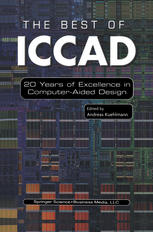

Most ebook files are in PDF format, so you can easily read them using various software such as Foxit Reader or directly on the Google Chrome browser.
Some ebook files are released by publishers in other formats such as .awz, .mobi, .epub, .fb2, etc. You may need to install specific software to read these formats on mobile/PC, such as Calibre.
Please read the tutorial at this link: https://ebookbell.com/faq
We offer FREE conversion to the popular formats you request; however, this may take some time. Therefore, right after payment, please email us, and we will try to provide the service as quickly as possible.
For some exceptional file formats or broken links (if any), please refrain from opening any disputes. Instead, email us first, and we will try to assist within a maximum of 6 hours.
EbookBell Team

4.4
32 reviewsIn 2002, the International Conference on Computer Aided Design (ICCAD) celebrates its 20th anniversary. This book commemorates contributions made by ICCAD to the broad field of design automation during that time. The foundation of ICCAD in 1982 coincided with the growth of Large Scale Integration. The sharply increased functionality of board-level circuits led to a major demand for more powerful Electronic Design Automation (EDA) tools. At the same time, LSI grew quickly and advanced circuit integration became widely avail able. This, in turn, required new tools, using sophisticated modeling, analysis and optimization algorithms in order to manage the evermore complex design processes. Not surprisingly, during the same period, a number of start-up com panies began to commercialize EDA solutions, complementing various existing in-house efforts. The overall increased interest in Design Automation (DA) re quired a new forum for the emerging community of EDA professionals; one which would be focused on the publication of high-quality research results and provide a structure for the exchange of ideas on a broad scale. Many of the original ICCAD volunteers were also members of CANDE (Computer-Aided Network Design), a workshop of the IEEE Circuits and Sys tem Society. In fact, it was at a CANDE workshop that Bill McCalla suggested the creation of a conference for the EDA professional. (Bill later developed the name).